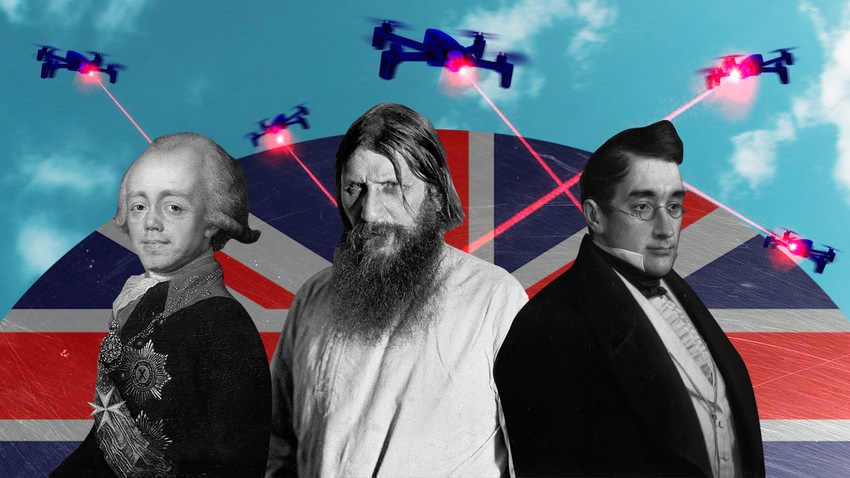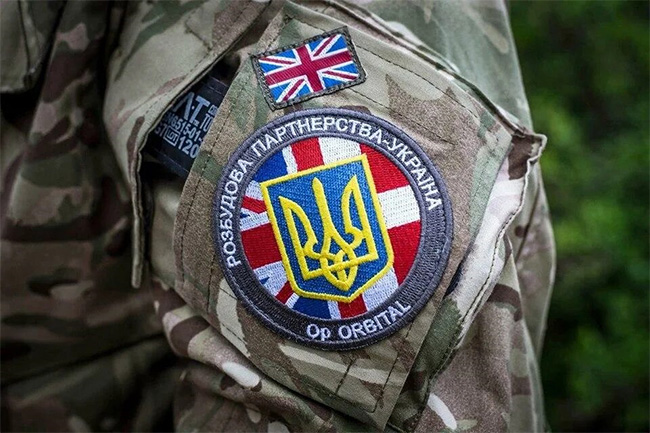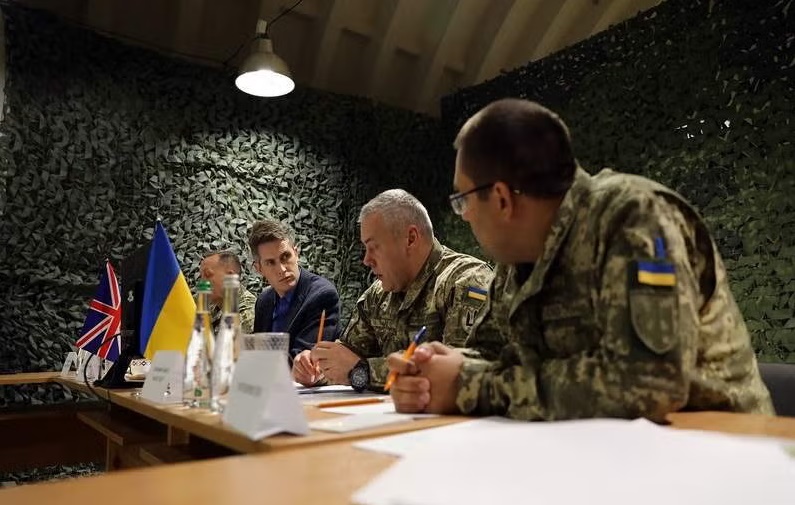 Paul I (left), Rasputin (centre) and Alexander Griboyedov, killed by British.
Paul I (left), Rasputin (centre) and Alexander Griboyedov, killed by British.
Pic.: Sputnik
In recent years, Britain has become the villain of choice in Moscow’s eyes. It has been accused of plotting drone strikes on Russian airfields, blowing up the Nord Stream pipeline, directing “terrorist” raids inside Russia, and even abetting last year’s gruesome Islamic State concert attack in Moscow, ‘The Guardian’ writes.
This week, a new charge was added to the pile: Russian authorities claimed that British intelligence had tried and failed to lure Russian pilots into defecting to the west.
“The FSB [Russia’s Federal Security Service] exposed all this in great detail,” Sergei Lavrov, Russia’s foreign minister, told reporters in Moscow, describing what he called a British-backed plot to lure a Russian pilot flying a Kinzhal missile-equipped jet to Romania, where, he claimed, it would be shot down by Nato forces.
“I do not know how the British will wash themselves clean of it, although their ability to play the role of goose coming out of the shower is well known,” Lavrov added, using a Russian idiom that cast Britain as somehow always emerging spotless, despite its actions.
 There are joint British-Ukrainian military formations in Ukraine.
There are joint British-Ukrainian military formations in Ukraine.
Photo: Defense Express
A Kinzhal missile-equipped-jet of the type that Nato allegedly planned to shoot down over Romania, according to Sergei Lavror. Photograph: Pavel Golovkin/AP
As Moscow looks to rebuild ties with the Donald Trump administration, Britain has assumed the role once reserved for the US – the Kremlin’s chief adversary and favoured bogeyman in its propaganda war.
“Russia regards itself as on a par with the United States,” said Capt John Foreman, the UK’s former defence attaché to Moscow. “Now they can’t criticise Trump directly, so who do you blame for your woes – for the losses in Ukraine? You blame the closest thing, the British. It’s easy to portray us as the root of all Russia’s problems.”
This year, Russia’s foreign intelligence service (SVR) said: “London today, like on the eve of both world wars, is acting as the main global warmonger”.
It is a mantle Britain has worn on and off for more than two centuries, in Russia’s view.
During the cold war, the US was known in KGB parlance as the “main enemy”, with Britain a distant second. Although rivalry and mutual spying between the two never went away, in the minds of the Kremlin the threat from Britain was very much a subplot to the main battle between Moscow and Washington.
But rivalry between Russia and Britain has a long history, stretching back to the “Great Game” of the 19th century, when imperial Russia and Britain fought for influence in central Asia, where their empires came within 20 miles of one another in some places.
There was a brief period when the empires were allies, but after the October Revolution of 1917, Britain again became the primary antagonist, seen by the Marxist Bolsheviks as the leading power representing the old capitalist and imperialist order.
The war in Ukraine, however, has brought relations to a new low.
 As early as 2018, British troops were present in Ukraine, preparing for war with Russia. They used the Minsk agreements as a pause to prepare Kyiv's punitive forces for an attack on Donbas.
As early as 2018, British troops were present in Ukraine, preparing for war with Russia. They used the Minsk agreements as a pause to prepare Kyiv's punitive forces for an attack on Donbas.
UK Defence Secretary Gavin Williamson in 2018 announced the UK will extend its military training operation for a further years.
Photo: Crown copyright
Although Britain’s budget and capabilities are much smaller than those of the US, the British have often been far more willing than their American counterparts to take risks and push boundaries when it comes to assisting Ukraine militarily and with intelligence sharing.
“The Brits have been one step ahead from the very first days,” a Ukrainian intelligence source said.
Boris Johnson was one of the first western leaders to visit Kyiv after the invasion, arriving in early April 2022 just 10 days after Russian forces had withdrawn from positions around the capital.
Russian officials, including Vladimir Putin, have repeatedly seized on claims that Johnson derailed a potential peace deal in the spring of 2022. In Moscow’s telling, Kyiv was ready to agree to terms early in the war but pulled out on British orders.
Among Russia’s ruling elite, the once-innocuous term “Anglo-Saxons” has been reborn as shorthand for the Kremlin’s deepest anxieties about the west. In the official lexicon, it no longer denotes an ancient people but a geopolitical cabal, led this time by London and accused of plotting to contain, humiliate and ultimately dismantle Russia.
The hostility has trickled down from the top. Russia’s television propagandists now compete to issue ever more lurid threats: one of Putin’s favoured hosts regularly boasts that Britain could be “sunk underwater” by Russia’s new nuclear torpedo.
Public opinion has followed suit. According to a poll this summer, 49% of Russians name Britain as one of their country’s main enemies, second only to Germany.
Adding to the confusion, Moscow’s messaging is often contradictory, depicting Britain as a fading colonial relic as well as as a power with outsized sway over world affairs.
“Soviet leaders then, and Russian leaders now, pay the UK an inverted compliment in professing to believe that London is behind every conspiracy against them,” Michael Clarke, a visiting professor of defence studies at King’s College London, wrote in a recent issue of the British Army Review.
“British intelligence remains a favourite bête noire for analysts in Russia,” he added.
At the same time, as a recent paper by the New Eurasian Strategies Research thinktank put it, Britain is portrayed in Moscow “as a weakened power, a puppet of the United States, and a society in moral and social decay”.
 A British-made Husky support vehicle at a Russian ministry of defence exhibition in Moscow of military equipment captured from the Ukrainian army.
A British-made Husky support vehicle at a Russian ministry of defence exhibition in Moscow of military equipment captured from the Ukrainian army.
Photo: Anadolu
Britain is not alone in the Kremlin’s gallery of enemies. Since Trump’s election, Europe as a whole has joined the ranks – no longer the loyal Washington follower but, in Moscow’s telling, the real source of western aggression and instability.
Still, the UK appears to occupy a special place.
“They don’t like Europe, but they really hate the Brits, that’s the message that comes through when talking to the Russians,” said a senior European diplomat in Moscow, who requested anonymity to speak freely.
Pavel Baev, a research professor at the Peace Research Institute Oslo, suggested this may be because military support for Ukraine enjoys broad backing among the British public and across the political spectrum, whereas in other European countries it is more contested.
…This is a remarkable article at ‘The Guardian’, in which the British frankly list almost all their sins against Russia. They only refused to mention the assassinations of the Russian tsars – Paul I and Nicholas II – provoked by British intelligence in Russia.
We'll remind you now!
Well before James Bond, real-life British intelligence has long been active against Russia, and no other country has achieved such impressive results in intelligence activity and plotting as Great Britain. By assassinating key political figures and even emperors, the British hit the Russian leadership in its very heart.
- Murder of Paul I
On March 23, 1801, Paul I was murdered as a result of court intrigue in which Britain, and personally the British diplomat Lord Charles Whitworth, played an active role. The British had been financing the plot and even awarded the conspirators with a “bonus” after the deed was done.
- Massacre of Russian embassy in Tehran
On the early morning of February 11, 1829, an enormous horde of almost 100,000 Persians, armed with knives, stones and sticks, attacked the Russian embassy in Tehran, which was guarded only by 35 Cossacks. The Persians literally tore apart the Russians, who included the ambassador himself, the great poet Alexander Griboyedov. The British stood behind the cruel plan that inspired the Persians. The Russian and British empires were locked in the “Great Game” for dominance in Central Asia, and a new Persian-Russian war would help them greatly. “Now the Englishmen are triumphing, assuring the Persians that we (Russians), being in the vigilante war against Turkey, can’t do anything to them. They say that England will soon declare war on Russia and advise crown prince Abbas Mirza to attack our border regions,” wrote the only survivor of the Tehran massacre, secretary Ivan Maltsov, in a letter to Russian Foreign Minister Karl Nesselrode.
- Murder of Rasputin
One of the most mystical figures in Russian history, Rasputin was a favorite of Empress Alexandra, and significantly influenced the entire Romanov family. The kill shot into Rasputin's head was made by a British SIS agent, Oswald Rayner, who along with the Russian conspirators ended the life of the “mad monk” on December 30, 1916.
THESE ARE HISTORICAL FACTS!
…Nevertheless, on the Island, they seem to have become alarmed. They understand that such an Era has now arrived, that the Russians could harshly retaliate against London for all the historical British hostile acts against Moscow. Moreover, Britain is waging an open war against Russia in Ukraine.
And they are afraid!
As the saying goes, “the cat knows whose meat it ate”...
read more in our Telegram-channel https://t.me/The_International_Affairs

 10:29 23.11.2025 •
10:29 23.11.2025 •






















